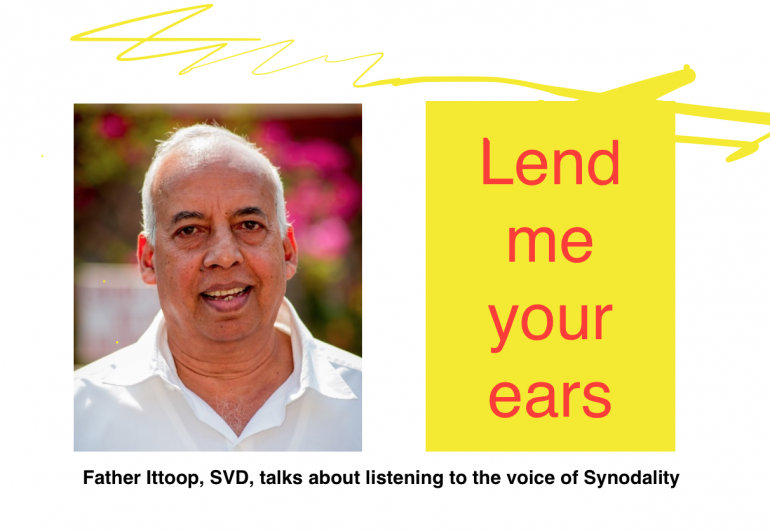Listen to the Voice of Synodality

From Vatican II, some seeds fell along the path, some on rocky places, some on footpaths, other seeds fell among thorns and still other seeds fell on good soil where it produced a crop. One such seed found its way to the heart of Jorge Bergoglio when he was probably a theology student and now the little sapling has found its way to the territory of Synodality. His invitation now is to prepare the ground for a new season of sowing. At this primary listening stage, he calls out: dear Cardinals, Bishops, Priests and people of God, "lend me your ears."
Our ears, even a child knows, stay open all the time, day and night too. It was not our plan. That's the way we found our ears, having no self-shutting possibility. The louder our neighbour shouts, the more alert it would seem that our ears stand.
And as children, we probably concluded that hearing and listening are the same things. Then we were surprised by different experiences like seeing the poor in undisturbed slumber, not very far from the loud shrieking train engine noises from some Indian railway tracks or stations. Their ears were open, but their hearing channels remained shut.
Then some of us realized that ears alone are not enough even to hear. The turn-on button inside the brain is a must for hearing. If you turn off that switch, you hear nothing while the ears are kept wide open.
You must have experienced some of your friends who have completely switched off the listening apparatus while pretending to be listening to you by nodding their heads. The invitation during this listening stage of Synodality is to see to it that you keep your inner hearing gadget on all the way through this kairos – season of Synodality.
To hear a sound, as we saw, ears suffice. To understand what is being spoken, to listen, you need not only the brain readied for hearing but the attention of the mind. If your mind is not where the sounds come from, you are doing something else other than listening.
We often let the mind decide differently. The real reason for shutting the mind is not often the amygdala in the brain but the nerve coming from the heart. If your heart does not like the voice of the one speaking, for whatever reason, you do not hear what is being said to you. While hearing the sounds from your neighbour, you are attuned to your inner personal grumble, coming from your self-righteous and judgemental attitude, coming from your heart and mind.
Your heart is not where your ears want them to be. Without the presence of our hearts, the mind loses the way and the truth. The invitation during this listening stage of Synodality is to turn on the ears of the mind and heart and stay attuned and attentive to those trying to communicate to us.
But for that to happen, the first and foremost suggestion given by His Holiness Dalai Lama's four-step guide for ever-lasting happiness is to be incorporated: "to give up labels." Let me quote him: "Do not ever consider yourself as different from another human being." He says, "I never consider myself as a Buddhist, or His Holiness The Dalai Lama or a Nobel laureate." The moment "I define myself by these labels," he says, "I become a prisoner." So, "I forget all these things; I simply consider myself as one of the seven billion human beings."
Does it not sound like the voice of "Fratelli Tuti"? We may have to remove many labels to consider everyone else as a fellow human being. One label Pope Francis often reminds us of is one of clericalism and superficial etiquette in which we can get imprisoned that can affect our way of listening to the people of God.
If we can surgically remove that sticker, along with the century-old taken for granted gender- label, and choose to get attuned to listen to everyone as brothers and sisters, the Synodality would usher in new hope.
Jesus, as he often went up the hills and the lonely- places to pray and to be with Abba, He also created an opportunity to listen to the lilies in the field and the birds in the air. The choice of being alone enabled Him to practice the asceticism of listening to non-speaking realities as well as to his own inner world.
When you listen to the other with a deep quality silence, you can almost hear what the other is trying to say. And if you pass on the correct words to the other while the other person is struggling for the right expressions, you are getting qualified as a liberating empathetic listener; you are not far from mastering the art of listening.
With that kind of gift of listening enshrined within, Jesus sat at the wayside well and listened to the Samaritan woman; the woman caught and brought in adultery in Simon's house; Mary and Martha not very far from their kitchen; Mary Magdalene in the garden even after His death; the doubting Thomas, the guileless Nathanael, the nightly curious interrogator, Nicodemus, the influential mother-in-law of Peter, the little daughter of Jairus, the local synagogue leader, the disciples, including the overambitious John and James and all. The invitation at this Synodality is to begin to follow the Master's way of listening to enter the heart of the other and become exemplary listener-disciples.
Mother Mary, too knew how to listen contemplatively, so she heard when God spoke. Having touched the presence of the divine pulse, she surrendered to God's words. So Annunciation happened, but not Magnificat. That hymn of joy had to wait till Elizabeth, with accurate penetrating empathy, heard her, listened to, understood and told Mary as she was trying to put words about her unsure thoughts. Elizabeth gently conveyed to Mary, "My goodness, you have come all the way from Galilee, you have full right to be troubled and confused as a young girl. I perfectly understand you, Mary and your, out-of-the-ordinary situation. And the truth you know, Mary, you are the most blessed among women, and blessed is the fruit of your womb!"
And Mary felt perfectly understood, found herself filled with heavenly joy, and sang her heart out into 'Magnificat.' Like Mary and Elizabeth, we shall enter this sacred season of truth-telling and listening, so that we may be able to sing together as people of God, a Synodal Magnificat.
Radio Veritas Asia (RVA), a media platform of the Catholic Church, aims to share Christ. RVA started in 1969 as a continental Catholic radio station to serve Asian countries in their respective local language, thus earning the tag “the Voice of Asian Christianity.” Responding to the emerging context, RVA embraced media platforms to connect with the global Asian audience via its 21 language websites and various social media platforms.
Comments
This is really great: simple and profound. For the last 2 years our Congregation has been working on synodality, the theme of our coming Provincial and General Chapters. I have also been involved in giving shape to the working paper for the Provincial Chapter. But some of the points you have so simply and beautifully explained are not found in any of the answers to the questionnaires sent around. Thank you so much for sharing your reflections. God bless!
G.K.
Feels really great to see a truly innovative write up on "lend me your ears." I had never thought to such depth about what you so succinctly mention as the asceticism of listening to non-speaking realities. It does for sure encourages one to master the art of listening and take seriously the call to enter in to the Master's way of listening. Thank you for your profound thoughts on synodality and the invitation to become an exemplary listener-disciple.
The article was very deep and profound. By reading it and listening with the heart bring the attitude of Jesus and the attentive listening to Samaritan woman by Jesus brought total transformation inher life.This kind of listening Iwant to cultivate in me.thank you for the reflection.
















- Reply
Permalink